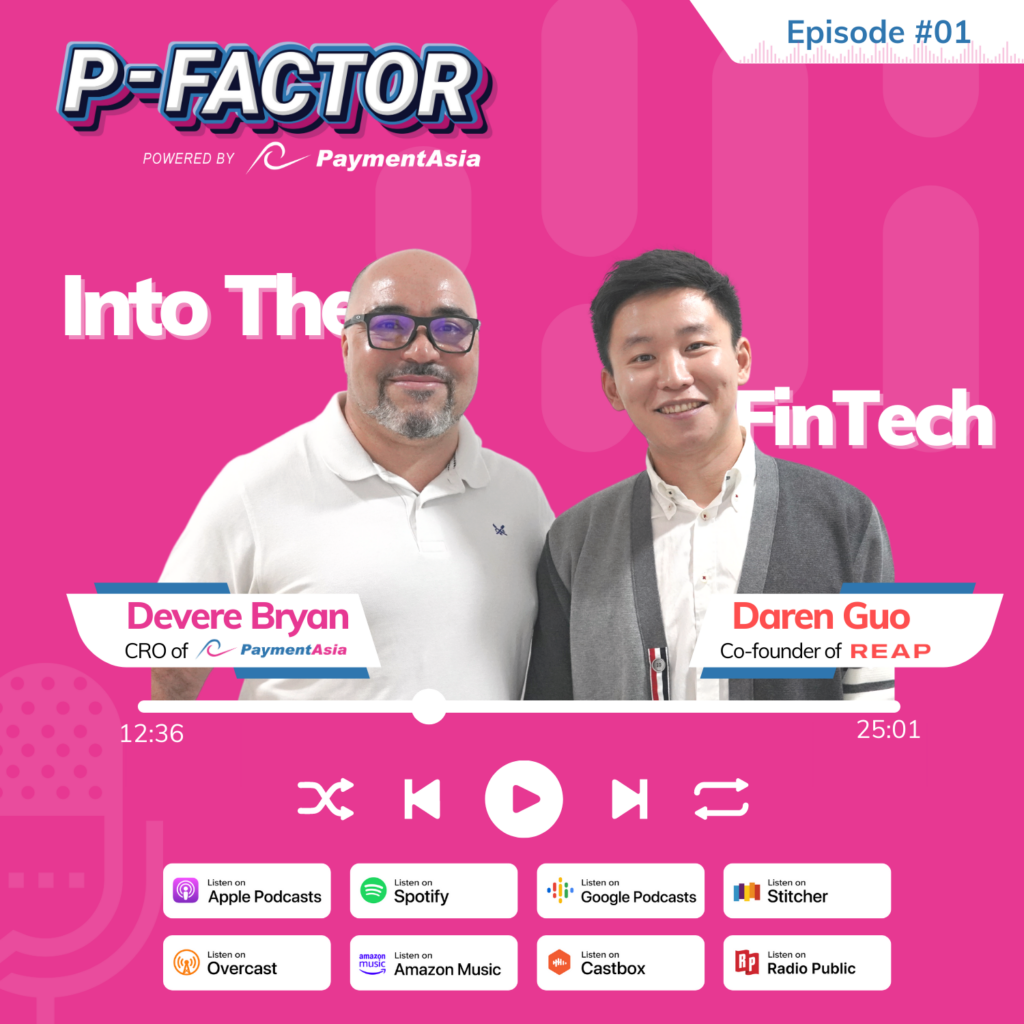Devere: Okay. Welcome to P-FACTOR. Our Guest today is Daren Guo from REAP, welcome my friend!
Daren: It’s great to be here. Obviously, our paths have crossed numerous times before, so I’m glad we’re touching base again.
Devere: Yeah, you know, you’re a very valued friend and a very valued partner of Payment Asia. And it’s exciting to have you today to talk about all things reap, all things, web 3 and some of the exciting Journey you guys have been on over the last five years. You Guys kicked off in 2018, right?
Daren: We did. And as most startups should, I think we’ve been evolving, adapting to some of the changes that we see some of the things that we’ve been hearing from our users, both new and old, so, excited to share some of those learnings and insights and bring some how we can continue to grow together.
Devere: Yeah. Magic, you know, you mentioned that we go back a little while and, you know, back in 2018 2019 I was working for Xero. Out of the small WeWork in Wan Chai, Hong Kong. And I remember looking out of a small office and you’re even smaller office where it was just you and Kevin starting this amazing startup and the journey started there. So I’m really excited to get to understand more about that. How did you guys kick things off at REAP?
Daren: Yeah, you were there from the inception of the business when it’s just to folks with a dream and I think, you know. In spite of all of the growth that we’ve had had recently, this is very much still the beginning for us. I think there’s a ton of problems left to be solved. I sort of solved it and I think that some of the, you know, new opportunities that we have identified and some of the other potential value that we can continue to add to our customers is very, very exciting. So we’re excited to continue the journey there.
Devere: Good stuff let’s get into it. I want to start off at the beginning about how you guys got started. You came from a big company. You know, I’m sure there are a lot of opportunities to stay there and you know, you took the plan, and you’ve used your imagination to deliver something new to the market, which is, you know, what we need, the concept of fintech right to come and disrupt and create opportunities for businesses to take something on that they wouldn’t have normally had. So well done! I’m so lucky. I’m really proud to have been able to see you guys deliver and man, like 14 million dollars raised at the end of last year at a time, where people generally weren’t able to pick up that amount of attention or investment like, how did that come about? Like, you know,
What’s the story behind your ability to deliver such a big race for the business in 2022?
Daren: Yeah, I think, you know. for us that the fundraiser is a compilation of obviously, starting with the team, right? And Kevin and myself, we’re pretty unique. We have a pretty unique relationship in the sense that we’ve known each other for 20 years, we’ve been best friends for 20 years, and there’s a certain degree of trust there. I think it is invaluable, and I was the best man at his wedding. He will be the best man at my wedding. So I think that, I think the culmination of my guests’ experience, and trust really resulted in, for us to be able to build something special. But I think for us, the key there, I think, is adaptability right. I think when it comes to fintech and financial services in general, especially over the last few years, it’s been moving at a pace. Things from regulations to licensing, to the needs of the users. Now, through certain things like crypto, it’s evolving, very, very quickly. And I think for us we’ve always been very iterative and trying to get 1% better every single day. So through that, I think adaptability becomes a key tenant for everything that we do, right? So obviously we started off as a payments’ company, really trying to sort of solve the ability to digitize finances, and do the sending and receiving of payments. But then when we realize, even as a fintech company that we were able to raise money, the corporate credit card experience that we were given by some other traditional providers, just wasn’t really adequate enough to help scale out some of our financial operations. So, we are really trying to solve our own problem and decided to issue a better software enabled corporate credit card that focuses on connectivity, focuses on access for global businesses of all shapes and sizes. And through our spend management and corporate credit card program, we work with folks, like, you know, Binance and Sompo insurance, and Amber to really orchestrate success by digitizing their finances, and finding a way to streamline their financial operations. And then I think that really started to resonate with a lot of different types of customers. So that’s how it obviously scales to where we are today but you know, honestly, the raise are just the beginning for us, right? There’s a ton of opportunity that we’ve seen and we’ve been, I guess pretty lucky to have the right capital partners, Payment Asia, included to be able to help us build the right product suites and really ultimately scale to serve bigger and better customers over time.
Devere: That’s amazing. You know what? And we’re so happy and we’re proud to be part of that recent raise and you know it showcases the strength in the economy in Hong Kong when it comes to the future and focusing on the future. Hey you know there’s a bit to unpack and what you just said. Going back to your relationship with Kevin like that trust piece. Like, but almost been like brothers, you know, like kind of growing together building a future together. That Foundation, I think that stays with, like the energy you push into the team, and you mentioned the team there as well. It’s like, how many people are working at REAP today?
Daren: A little over 55. Just crossed that recently.
Devere: Cool, congratulations. So, you know, that’s a, that’s a big growth trajectory over the last three or four years, And you know, I show, you know, that’s evolving with the business as you change and evolve as a company as well, right? So to your point, right, my understanding at the beginning was spent management payments, what is REAP today and what do you see read being in a year’s time? 2 years time, what’s the vision?
Daren: Yeah, so I think we really see ourselves as more of this financial services platform. And we’re trying to really build out the ecosystem to provide not just corporate credit cards, but everything from payments to now treasury to doing more unique things for the web3.0 segments. Specifically, what we find is that businesses, similar to the way. They think banks are really a one-stop shop, right? They provide either services and products directly or they have the right Partners to be able to build out and provide a more comprehensive experience for the user. And when it comes to financial services, it often involves a lot more trust and security because of the nature of what you’re helping provide efficiencies for. And therefore you know in order to establish that trust with us as a platform, there’s a very natural progression of trying to get other types of value from you and hopefully, you’re able to find ways to deliver that. I think, for us very specifically, the corporate credit card is obviously our wedge, and is sort of the landing spot to be able to acquire and start a relationship with a lot of these users. But as they evolve and they sort of facilitate more transactions on us as we build more credibility with them as a trusted partner. There’s a ton of other products that we have in the pipeline, right? So everything from the re-treasury side, what we want to give yield and interest in the form of US Treasury t-bills back to our users. This is one example of something that very organically happens through our platform through the relationships and the conversations that we’ve had with users. And then I think we also want to evolve based on trends that we see from a macro basis. So Web 3.0 and crypto is obviously something I think Hong Kong as a whole is incredibly excited to try and I guess power and enable for a lot of new entrepreneurs everywhere and we want to be a part of that story and enable growth for that particular segment as well. So there’s a lot of infrastructure projects that we are working on with them and hopefully as they become designated partners for us we can find a way to be able to distribute it and and you know, add value to a broader array of different color clients over the world. So a lot of exciting exciting momentum. That’s driven out of Hong Kong and that’s the part that I’m most proud of, right. First and foremost we started in Hong Kong and I think Hong Kong has a very high chance and probability of owning one of the fron-tier technologies and innovations that we’ve seen in the form of blockchain. So if we can find a way to enable growth and find ways to connect that to the real world, and the real world asset side. I think that’s going to help. I guess normalize that technology and also be able to translate it in away that you know, everyone can understand. So that’s sort of how I think about the future.
Devere: Yeah. And it does a lot of it comes back to the trust piece, right? People, I remember maybe 6,7 years ago. When I was working cross-border myself, we have an old company, I work for called bucks. We signed a relationship with OkayLink, which was okay coin. And at the time the blockchain structure was seen as being unknown and trustworthy. You know and secure but what you know of the people haven’t developed the confidence in it. Fast forward to this week last week. And you’ve got the new vast licensing, the regime opening up in Hong Kong, you guys are clearly you know moved ahead. You know of the pack I would say right? You are forward thinking with regards to that opportunity broadening what do you think that does to the landscape in Asia? What is it? Leave Hong Kong with regards to like the pack when it comes down to leading Web 3.0 Innovation.
Daren: Yeah, I think your point about sort of like, there’s going to be incremental, I would say improvements and every single time there’s this paradigm shift, right? If you think about the Internet, when it was first created, it also was fraught with different issues. And you know the trust and security part was also very lacking. But nowadays, we can book a car from a random stranger and step into that car. We can book a random person’s place from all over. And that’s sort of enabled by the internet, infrastructure and economy. And that’s incredible to see. I see blockchain technology in a very similar manner where a new wave of internet-enabled businesses are built on a sort of trustless blockchain system. I think there’s going to be a lot of value that can be created there. We’re very excited about some of the new regulatory developments right?. I think vasp in the Hong Kong government has done a pretty good job in building up a better brand, able to welcome some of the new projects and new innovators to be able to come and see Hong Kong as this place where you can drive innovation, you can drive growth for the value-added services that you’re building and I think it provides more clarity for a for us but also for everyone else that’s you know evaluating on where in the world they can you know find ways to be able to truly innovate to write and I think that Clarity and consistency is going to be key for entrepreneurs. So I’m excited to be supporting and I’m trying to find ways to provide insights and advice where we can. But also at the same time, follow some of the regimes and the ordinance is fairly closely to make sure that we are also innovating in a way that’s sort of copacetic and above board with a lot of the folk, the regulatory bodies that were working with.
Devere: Yeah, absolutely critical right to stay across compliance across the fast pace of change, that’s happening in crypto generally. So you know, that’s as well as right. So you’re focusing on Web 3.0. reasonably recently I’d say and the journey of the last five years, where do you see your core focus for SMEs or midsize businesses in Hong Kong at the moment. Like, how does REAP help your average business live a better life, or how do you help them in their digital transformation journey? Which is the classic cliché way of saying, you know, get your stuff off paper. Get it into the cloud somehow. Like what’s your kind of modus operandi with that?
Daren: So I think when it comes to digitization this is something that we’ve seen not just from digital or technical businesses, right? I think a lot of SMEs of the world are also seeing the benefits of what it means to really be embracing and cherishing this sort of internet economy and covid of all the negative byproducts is probably one of things that was positive where they were able to realize very, very sort of this really exactly what the advantages that can gain by being more digitally efficient and the propensity to sort of digitized more of their infrastructure and financial operations becomes a competitive advantage as opposed to just purely a cost center. For us, I think it really starts with the payment side, right? If you think about payments, it is the lifeblood of a lot of businesses and is the direct point of entry that they first think about when it comes to the journey of digitization, everything from e-commerce to being able to work with international customers, that they wouldn’t be able to reach before. These are all some of the amazing, I would say, positive externalities that can come from digitization. And at the end of the day, small businesses, Web 3.0 Enterprises. I think growth is often top of mind. And I think if we can convert them to think about digitization as a function of growth as opposed to a function of cost. I think that transformation in terms of mindset will have a really strong trickle-down effect in terms of digitizing other aspects of their business. And we follow a very sort of similar user journey. We start working with them on the payment side, we issue them a corporate credit card and then they start to see some of the spend controls the virtual cards that were able to issue the payables management that were able to provide. And they’re able to not just sort of by our story but feel the change as they incorporate some of these transformations into their financial operations. And by actually seeing it and feeling enough from just a corporate finance level. But from employees not having to go through expenses. And, you know, stapling receipts onto a piece of paper to get finance to approve as they go through some of these user experience enhancements. This is where they truly get the aha moment where we’re all looking for one. On the product side. I think that’s something that we want to continue cultivating and I think some of the new products that we have developing will, like it would say, sort of lead the charge on some of these mindset changes over time.
Devere: Yeah you know what’s funny? Use. Aha. And in my own mind I had a lightbulb moment. I was going to say, I think you’re creating light bulb moments for businesses, small and large, right, where they can see the benefits and it’s funny. You thought back to 20, 30 years ago, 25 years ago, you know, to the dawn of the internet age and what not? And I think even 10, 15 years ago, people were still reluctant to use, like, online banking. You know what I mean? Like, people were still going with a paper queuing up at the bank. Now people are like, well, some people still do that, we’ve got laggards that will still want to hold onto that passbook, but the majority of people are confident now going into their banking and managing payments managing their accounts even looking at their wealth structure, right? So I think, you know, the evolution of the fintech world has impacted, not only the new fintech companies that have come out over the last 10-15 years. But also the big banks and whatnot, right? Those guys have been forced to digitize because of the innovations of companies like REAP. I think one of the interesting things is that I would love to understand more about REAP. That I was at one point. I remember being in a meeting with you at Visa’s HQ in Singapore. What’s your span like? What’s REAP’s coverage across Asia, you mentioned, you’ve got global aspirations, what’s the long-term view? The picture for REAP?
Daren: Yeah, I think when it comes to financial services and fintech it’s actually typically a regional type of play, right? I think the only financial services or one of the only ones that has truly sort of transcended geographic boundaries is Visa and MasterCard networks, right? You think about payment methods in China? Alipay and WeChat Pay, domestic product bank accounts are not cross borders where you can use your bank account to pay for different products and services. When you travel all of them, I would say Legacy players. And, you know, Visa and Mastercard have done a phenomenal job connecting financial services across the world. You can take a Hong Kong car and be able to use it in Europe and in North America and as long as it’s part of the Visa Network. And I think that enables us to be able to reach some of our Global aspirations a lot faster because we have such a strong partner in Visa to be able to get us there. Yeah, so I think for us, we think about some of the learning that we’ve had in Asia and how it can apply to other places all over the world. And by working with Visa, we can bring some of our solutions to them. So, because a lot of the issues and pain points that they’re facing are very similar to the ones that we’ve learned about, and it’s about incorporating their needs into our roadmap and finding ways to solve them. So I think these have very strong partners for us there to be able to get done. So I think the other interesting aspect about Well, is being in Hong Kong, Hong Kong. As we know, it has always been the financial hub of Asia. It has been able to attract conglomerates and international companies for decades. So as a result of that, the infrastructure we’re able to get advantage of in terms of banking multi-currency enables us to work a lot with different types of companies all over the world. So I think that advantage is something that’s not lost on me and I think Hong Kong has such a head start, when it comes to the financial infrastructure side that people don’t actually realize, even in places, like Silicon Valley or where I used to work, the access in the infrastructure, as actually not as good as the ones that I’ve experienced in Hong Kong. So I think there’s a lot of, you know, development that can happen and better branding that can showcase Hong Kong as a place where fintech can thrive. And if we can find a way to, I guess, inform and educate the world of the advantages here. I think there’s going to be a lot more innovation that can happen driven out of Hong Kong.
Devere: I agreed with you. I think Hong Kong, I think over the last few years Hong Kong has been seen as somewhere that has been shrinking in its global impact with regards to financial services, but living here hasn’t really felt like that. It felt like other places have grown, but Hong Kong hasn’t shrunk. And I think that the recent, we were participants and we had a big booth at the Hong Kong fintech week in October last year, and it was amazing to see the amount of innovation. The amount of focus on Web 3.0 products as well, was just like, it was the Vanguard piece. It was the normalized piece but seemed like it was from the future, you know. So, you know, is that really going to be like the number one focus for you guys now is like leaning into more enterprise businesses are web three businesses that are focusing. Like, in that crypto space, are you still focusing at all on traditional merchants and SMEs and whatnot? What’s the kind of percentage of your mindset right now for REAP?
Daren: Yeah, I think the way I think about it is that there’s going to be have to be a convergence between these two worlds. That seems to be, you know, worlds apart today. But I think for us our role is to really act as the bridge between traditional businesses and some of the new digital assets, digital finances and digital solutions in general. That is available and relevant and hugely value-added for a lot of these businesses. So, as an example, we work with traditional traders, folks that have been trading commodities, and things of that nature and in Hong Kong for decades. They work with a lot I would say emerging markets where currencies can be volatile and unstable and stable coins as an example, could be very much a hugely important piece to be able to normalize, and I would say stabilize, a lot of their currency and treasury management side, right? So this is just one example, many, where traditional companies can very much leverage some of the new innovations, and developments of crypto assets and the Web 3.0 world. A lot of folks think about the metaverse and some of these really crazy, I would say sort of exotic ideas of sorts, but I think there’s actually a lot more tangible benefits of Web 3.0 and crypto that we want to be the education layer for the companies, both on the traditional side and also some of the more equipped own native and web three side. I think that the role of Hong Kong, it’s going to be important here because when it comes to front-tier technology, there is AI, right? Whether it’s an autonomous vehicle, things of that nature. It’s going to be very difficult for Hong Kong to have a role there, just because of talent, because of infrastructure, right? It’s hard to imagine autonomous vehicles driving up the hill so that the peak in that way, but I think when it comes to crypto and and Web 3.0, there’s a very much a non-zero chance that we can become one of the world leaders for that and that’s a very, very exciting to be a part of it, especially in the early days, right? So if we can find a way to, you know, better bridge some of the Web 2.0 and Web 3.0 understandings at the financial infrastructure level at the regulatory level, there’s going to be a lot of benefits at the end of the day for all of the businesses and especially the small businesses that are in abundance in Hong Kong, you know.
Devere: I think as well, right? You know, I look at the role that REAP has taken over the last five years and I know that you’re a very sticky business. So a lot of those people that joined you in 2019-2020, they’ve been on that journey with you and it goes back to some of the first things we talked about here. The fact that you’re moving or you’ve moved into the Web 3.0 world and now you’re focusing, that develops or Ghana’s trust from them to move with you. Maybe try out, you know, that they thought was separate from them. You know they’ve probably joined you at that point to enable themselves to get access to credit and a credit card that they couldn’t get access to from whatever reasons from traditional banks in the past. But now with you guys are able to get on board, and now they’re able to accelerate into like, a just touched on, kind of the future in their minds, you know, by suddenly becoming part of the Web 3.0 world. So as educators, but you’re, you know, you’re bringing people along and educating them on the journey. While trying to convince people to join you at the same time. So that’s amazing. And the fact that people trust you enough to keep on track and keep with you, it says everything about the quality of your product. Obviously, I know you guys have done an amazing job of making sure that the onboarding journey is amazing and the customer service journey for clients is top-notch. So that’s beautiful. Okay, so you know, we’re coming towards the end of the hour journey, Daren. So, you know, give me like, how do we get hold of, like, REAP. What do I do if I’m a SME in Hong Kong or find an enterprise business that is looking to expand and get access to your services? Like, what’s the best way to move forward and what advice would you give me two and get started with REAP?
Daren: Yeah, I think for us, we really try to make the onboarding and sort of discovery process as easy as possible. So everything from the onboarding registration account, activation process can all be done seamlessly online without human intervention, if needed. Obviously, as a financial services platform, you know, getting in touch with humans is quite important for that trust side and for the education side. So we’re very much available through our website at reap.global. We have support on multiple channels, in the form of WhatsApp, telegram, intercom, email obviously. So I think if there’s any question that users can have? We’re always there to handle it. And the other aspect is we are global minded, right? So we have support folks in Europe and Malaysia to be able to provide essentially 24/7 coverage across all of the time zones for our global clients. So if you want a card, if you want to be able to streamline and automate a lot of your expense management process, feel free to reach out at reap.global and we’ll be happy to help.
Devere: Fantastic! And obviously, you’re a very highly valued and important partner of Payment Asia, you know, we look at REAP as an amazing extension of our services and you can click through and find your site on our site as well. Like all good partnerships should be. It’s a collaboration and we’re very proud to have you as a partner and I’m really proud to have you here today. Darren, you’re always being the super affable guy. Like I said, seeing you guys grow from 2 to 55 from really like, kind of focused on one or two things to know having you know, seven or eight key parts of your product and building out to becoming a proper fintech platform is just it’s a thing of dreams, my friends and I’m really really happy your dreams are coming true and we look forward to seeing more success from REAP over the coming years.
Daren: Thank you for your support along the way and I’m sure we’ll have another conversation in the near future.
Devere: Yeah, TBC for sure.
Daren: Thanks, mate.










